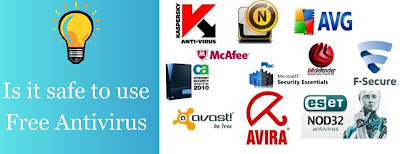With the rise of cyber threats and the increasing need for digital protection, antivirus, and security software have become essential tools for safeguarding our devices and personal data. While many reputable paid options are available, the allure of free antivirus and security software is undeniable. After all, who doesn't appreciate a cost-effective solution to protect their digital assets? However, the question remains: Is it safe to use these free options? In this blog post, we will explore the pros and cons of free antivirus and security software to help you make an informed decision about your digital protection.
The Appeal of Free Antivirus Software
Free antivirus and security software offerings have gained
popularity for several reasons:
Cost Savings:
As the name suggests, free software doesn't require any financial investment, making it an attractive option for budget-conscious users.
Basic Protection:
Many free antivirus tools do provide a baseline level of protection against common threats like viruses, malware, and phishing attempts.
Popularity and Trust:
Some free antivirus products come from reputable companies, instilling a sense of trust among users.
The Potential Risks
While free antivirus software might be enticing, it's
crucial to understand the potential risks associated with relying solely on
these free options:
Limited Features:
Free versions often lack some advanced
features present in their paid counterparts. These may include real-time
scanning, firewall protection, and automatic updates, leaving your system
vulnerable to emerging threats.
Annoying Advertisements:
Free software may display ads or
prompt users to upgrade to the paid version frequently. This can be a source of
annoyance and distraction.
Data Collection and Privacy Concerns:
To sustain free
services, some software developers may collect user data and browsing habits to
target advertisements or sell to third parties, raising privacy concerns.
Lower Detection Rates:
Independent tests have shown that
free antivirus tools tend to have lower detection rates compared to premium
solutions. This means they may miss some sophisticated or newly emerging
threats.
Potentially Ineffective Support:
Free software may have
limited customer support, leaving users on their own when facing technical
issues or complex security challenges.
Balancing Safety and Affordability
While free antivirus software may provide basic protection,
it's essential to find the right balance between safety and affordability. Here
are some recommendations to consider:
Research and Reviews:
Before choosing any free antivirus software, conduct thorough research and read user reviews to gauge its effectiveness and reputation.
Stick with Reputable Brands:
Opt for free antivirus products
from well-known and established companies with a history of providing reliable
security solutions.
Consider Freemium Models:
Some antivirus companies offer
"freemium" models, where the basic protection is free, but additional
features and enhanced security come with a paid upgrade. This can be a good
compromise if you need more comprehensive protection.
Supplement with Best Practices:
Regardless of the antivirus
software you choose, practice safe digital habits, such as regularly updating
software, avoiding suspicious links and downloads, and using strong passwords.
Evaluate Your Needs:
Assess your specific security
requirements. If you engage in online banking, sensitive work, or other
high-risk activities, investing in a robust paid antivirus solution might be
worth the cost.
Conclusion
While free antivirus and security software may provide basic
protection, it's essential to be aware of their limitations and potential
risks. As the cyber threat landscape continues to evolve, relying solely on
free options might not be sufficient for comprehensive digital protection.






0 Comments